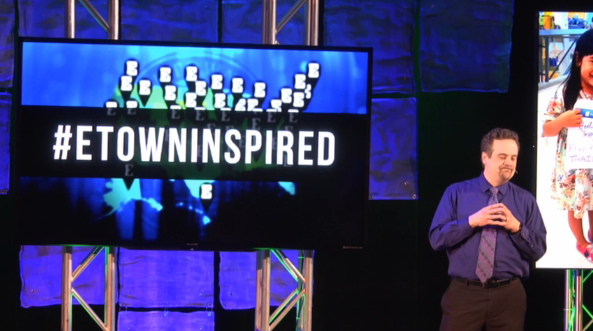You have /5 articles left.
Sign up for a free account or log in.

Elizabethtown College
Can tweets and Tumblr posts trump black-tie events and balloon drops?
That’s what Elizabethtown College, a private liberal arts college in Pennsylvania, hopes. Last night the college eschewed the traditional capital campaign kick-off -- complete with formal attire, live music and the promise of a special announcement -- for one that took place mostly online. By promoting the campaign on social media, the college believes it can recruit a younger generation of donors that will help it reach its $50 million fund-raising goal.
“We know that for a lot of colleges and universities coming out of the recession, giving has been harder,” said Carl J. Strikwerda, the college’s president. “We wanted to see if we could reach all kinds of people who wouldn’t have known about an event like this.”
During a live-streamed half-hour event Wednesday night that mixed prerecorded segments with live appeals from members and alumni of the college, speakers explained how the money would go toward facilities, scholarships and support for teaching and research. Meanwhile, viewers in 10 countries and nearly every U.S. state were invited to spread the message about the campaign on social media using the hashtag #EtownInspired. The live event was the culmination of a daylong donation drive.
Hey @EtownCollege, Student Senate's feeling #EtownInspired too, right from our home base pic.twitter.com/txYTj6Ox7H
-- Etown Student Senate (@EtownSenate) March 16, 2016
Thinking about my alma mater @EtownCollege today from Seattle and Kirkland, Washington #EtownInspired pic.twitter.com/mkz0RDdEhA
-- Mentha Benek (@Mentha) March 16, 2016
Strikwerda said the college believes the live-streamed launch of the capital campaign is the first of its kind. News of the campaign drew praise from the Council for Advancement and Support of Education, which assists colleges with alumni relations, communication and fund-raising, among other tasks.
“It is exciting to see institutions thinking beyond the more traditional engagement strategies of a campaign,” Sue Cunningham, president of CASE, said in an email. “Many of our member institutions use social media and new technologies to reach their alumni and other constituents worldwide. Including a live-stream component, or using it exclusively in a campaign announcement or as part of the overall campaign strategy, indicates the resourcefulness of our institutions and their commitment to engage and involve their stakeholders wherever they live and through their communication of choice.”
The idea for the online-focused campaign came from a one-day fund-raising event held in March last year, Strikwerda said. The event attracted about 800 donors, easily topping the goal of 200. When the college later examined why the campaign exceeded expectations, it discovered many donors were swayed by word of mouth.
“When we went back and looked at it, we realized how much of it was carried through social media,” Strikwerda said. “We realized that some of those people were incredibly more effective than anything we were doing.”
Strikwerda acknowledged that the college is tapping into a fund-raising strategy that has boosted many political candidates, most recently Senator Bernie Sanders and his impressive haul from small donors. The campaign’s investment in online fund-raising -- through email blasts and social media -- has set new records in terms of small-donor money as a percentage of total donations.
“We’re much more aware that digital media is the way a lot of people connect,” Strikwerda said. “There’s a huge potential here. If we do a big enough cyber event and get more people started, what’s the penumbra?”
But by banking on news of the campaign spreading organically on social media, the college is attempting to control a volatile force. Try too hard, and the college could be accused of astroturfing -- pushing a commercial message under the guise of popular, spontaneous support. If it doesn’t try hard enough, the college might see its social media campaign cause a blip Wednesday night but quickly fizzle out.
“It’s an experiment,” Strikwerda said in response to those challenges. He described Wednesday night’s event as a “prototype” for testing the efficacy of an online launch. The college plans to track how news of the campaign is posted and shared across social media to inform future campaigns. The college also has some ideas about how to sustain the campaign beyond Wednesday night, which will likely come in the form of digital updates keeping followers up to date.
“If this thing works well, we learn a lot from it,” Strikwerda said.
Elizabethtown isn’t ready to take its capital campaign fully online, however, as doing so could disconnect it from alumni who aren’t active on social media. Even though Brian C. Helm, the college’s director of client services, earlier in the day said there was “no pressing need” to physically be in the room, about 300 people showed up to the Wednesday evening event in person. The college will also later this spring devote part of its magazine to the campaign to attract traditional donors, Strikwerda said.
Those scaled-back physical fund-raising efforts will still save the college thousands of dollars. A capital campaign launch, depending on its level of swankiness, can cost a college tens if not hundreds of thousands. Elizabethtown’s event, in comparison, featured only “light refreshments,” Helm said.








